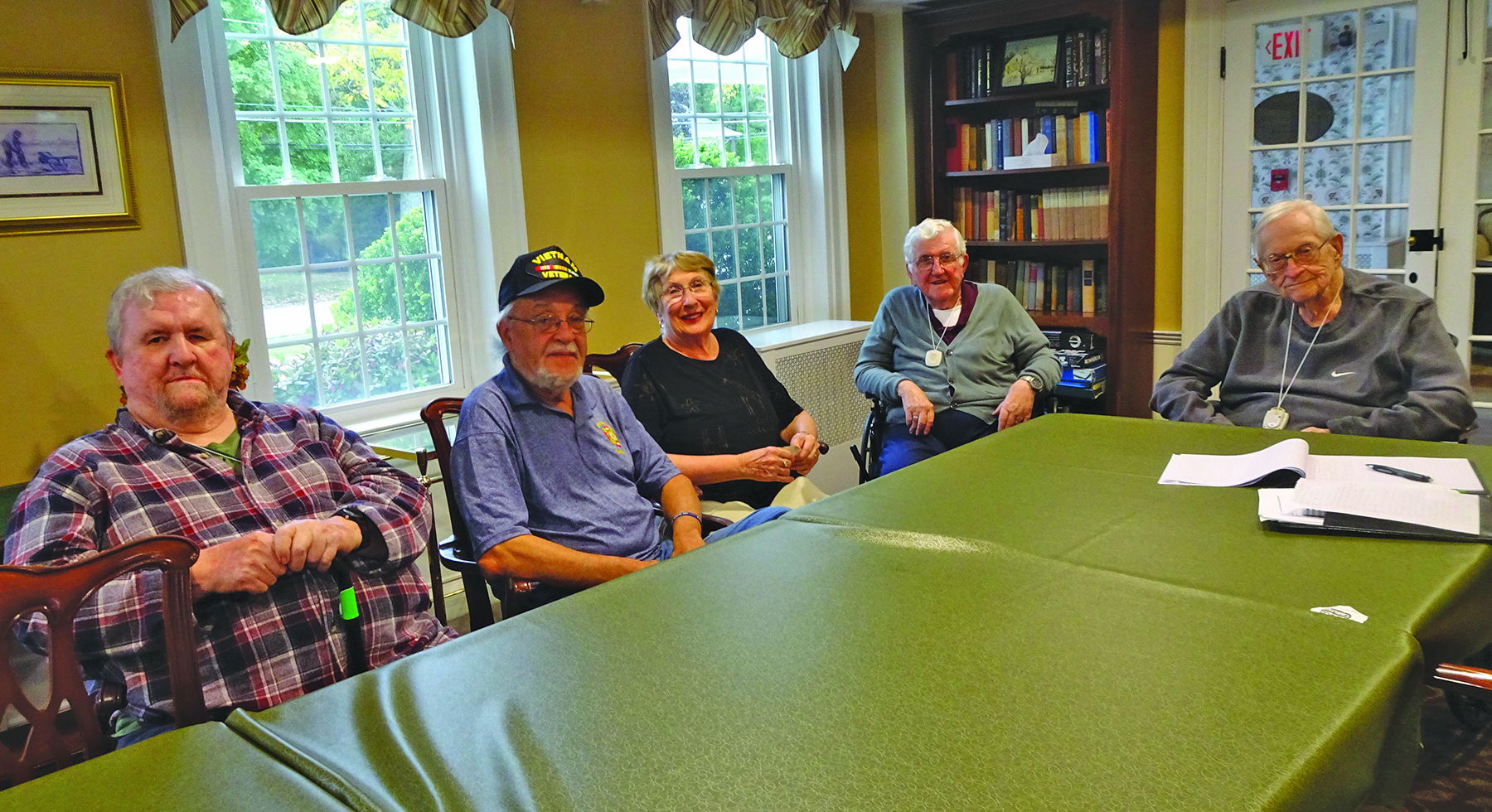For many, Veterans’ Day is just another three-day weekend in the list of holidays our country observes each year. But for veterans, it is a lot more personal. We were offered the opportunity to spend some time with local veterans recently to talk a little about what branch of the military they served in, whether they served stateside or were deployed overseas, and some life lessons they learned along the way.
We gathered at the Community of Pond Meadow and Pond Home, in Wrentham. The veterans who sat around the table had varied assignments. One fought in WWII, another in Korea, while another was sent to Vietnam. Others stayed stateside. While their experiences were varied, they shared a bond: they had all served their country, and not a single one present expressed regret that they had served.
Edward Cavallari, originally from Northampton, served in WWII with the Army, witnessing the freeing of Paris from the Nazis, and much more.
Joseph Vatkevich, from Osterville, served with the Army Corps of Engineers during the Korean conflict, helping to build bridges to facilitate the movement of troops throughout that country. He was involved in helping rescue a general who had been taken captive by the North Koreans. And yes, the general (and Joe) came out of the operation alive.
Kathleen Slader, originally from Ohio, was entranced by WWII movies with nurses in the Navy, dancing onboard ships, and when she found herself out of high school with no money to go to college, she went into the service, joining the Air Force. She served in peacetime, from 1960-1963 and remained stateside.
Bill Rex was in the Air Force from 1954-1956, remaining stateside, and was trained in chemical and biological warfare. He took that training and went on to be a science teacher, spending the next 38 years in education.
Roger Mitchell, from Wrentham, also remained stateside, serving in the Army National Guard from 1962-1968.
Ed Kelly, from Franklin, went into the Army and served in Vietnam from 1968-1969.
Each veteran has carried life lessons with them from their time in the military.
Cavallari noted that he learned about handling finances, which was helpful when he started a supermarket with a partner after he was discharged in 1946. “When we were in the service we got no special privileges,” he recalled.
Vatkevich pointed to the GI Bill. “After I got back I went to Bentley. The military offered me an education.” He also recounted spending an evening in Korea with the actor Raymond Burr, of Perry Mason fame. “We had an evening together, just the two of us, and a bottle of whiskey. He told me to look him up when I got back but I never had the chance. He wasn’t famous back then. Years later, when I was traveling through Virginia I noticed a sign for the Raymond Burr memorial, so I stopped to pay my respects.”
Slader related that she had gotten training to be a medical technician. When she arrived at her first assignment, she was asked what she needed most to practice. “I had only drawn blood a few times, so I answered ‘venipuncture.’ They pointed me to a room and by the end of the day I had drawn blood from fifty young, healthy men with great veins. I had gotten really good at drawing blood by the end of the day!”
At his last physical before being shipped out to Vietnam, Kelly wondered what the Army would do with him—his right finger had been damaged in an accident years before. “Don’t worry,” was the doctor’s answer. “We’ll teach you how to shoot.” And they did….
Several of the veterans who gathered in Wrentham described encountering racism while in the service. Vatkevich related a story. After going into a bar with a fellow service member, they were both served a drink, but then the bartender took his friend’s glass when he was finished and smashed the glass on the counter. “My friend was black. That bartender had to serve my friend, but he was making sure no one else had to drink out of that glass again. That experience has stayed with me,” he said, shaking his head.
Cavallari reflected on his time in the service and said, “You come out with a different outlook. You go from being a teenage kid to half a man, and then things start to happen. From there, you go from being a kid to a man. I lost a few of my best buddies. I’m in favor of mandatory service. It’s a form of discipline you get nowhere else. You learn how to get along, to obey rules and regulations, to do what you’re told, and accept responsibility.”
Ed Kelly paused as the veterans finished up. After talking together for an hour or so he said, “It’s good hearing these stories. We haven’t been forgotten.”
We often take for granted the freedoms we enjoy. Spending some time talking with veterans who have served is a great way to be reminded that the freedoms we enjoy in this country have come at a cost. May we never forget.

Issue Date:
November, 2019
Article Body:
